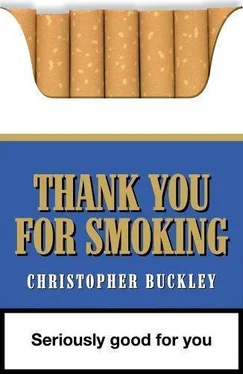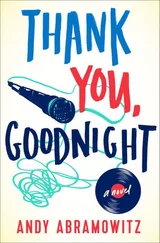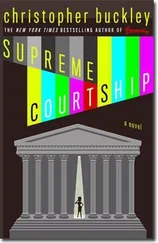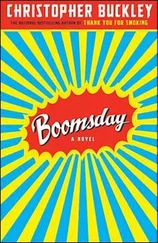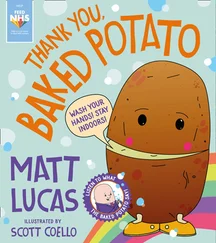"Thanks, Bryant. Four days ago, Nick Naylor, chief spokesman for the tobacco lobby, was abducted outside his office in Washington,D.C. He was found, later that night, with a sign around his neck that
said he had been, and I quote, 'Executed for crimes against humanity.' His body was covered with a lethal number of nicotine patches, the kind prescribed for smokers who want to give up. According to doctors at George Washington University Hospital, he was near death when he was brought in. The FBI is investigating the case, which seems to indicate that at least one element of the anti-smoking movement has adopted the tactics of terrorists. Mr. Naylor joins us this morning from his bed at George Washington University hospital. Good morning."
"Good morning, Katie."
"I know this has been quite an ordeal for you. My first question to you — How did you survive? Reports are that you were literally covered with patches."
"Well, Katie, I guess you could say that smoking saved my life."
"How?"
"As a smoker, a pastime I happen to enjoy along with fifty-five million other adult Americans, I was able to absorb the dosage, though it did almost kill me. If those policeman hadn't found me when they did, I wouldn't be chatting with you today."
"We'll get back to the issue of smoking—"
"If I might point out, Katie, this just goes to prove what we've been saying for some time now, namely, don't mess with these nicotine patches. They're killers."
"But not if you use them as directed, surely."
"Katie, out of respect for your viewers, I won't go into what these things did to me, the nausea, the projectile vomiting, the paroxysmal atrial tachycardia, the cutting off of blood to the brain, the numbness and cold in your extremities, the horrible skin rash, the blurred vision and migrainous neuralgia. So I won't go into all that, except to say, If that's what a bunch of these patches can do, well, huh, I can only imagine what just one could do to a normal, healthy smoker. So put me down for a big resounding, Just say no."
"We understand that a note from the kidnappers was delivered to the Washington Sun."
"I'm not sure I'm supposed to comment on that, Katie."
"It's in today's edition."
"It is?"
"So it's already out there. Would you like to hear what it says?" "Uh. "
"Quote, Nick Naylor is responsible for the deaths of billions—" "Billions? Millions, surely." "No, it says billions."
"Well, that's absurd. I've only been with the Academy for six years, so even if you accepted the 435,000-a-year figure, which of course is completely nonsense anyway, I would only have been quote responsible unquote for what, two-point-six million. So I don't know where this individual is getting 'billions' from? What am I, McDonald's?"
"Should I go on?"
"Please, yes, by all means, I'm fascinated."
"He was dispatched as a warning to the tobacco industry. If they don't stop making cigarettes right now, we will dispatch others."
"Was this by any chance written on the surgeon general's letterhead?"
"I beg your pardon?"
"I thought I recognized her style. No, of course, I'm kidding, Katie. Humor, you know. The best medicine…"
"Do you have any idea who might have done this to you?"
"No, but if those people are listening, as I'm sure they are, being probably big fans of yours as I certainly am, I'd like to say to them, Come forward, turn yourselves in. I'm not going to press charges."
"You won't?"
"No, Katie, I think people who would do something like this need help, more than anything."
"That's a very tolerant point of view."
"Well, Katie, you can't spell tolerance without the t in tobacco. Our position all along has been, we understand there are people who care strongly about smoking. We're saying, Let's work together on this. Let's get some dialogue going. This is a big country, and there's plenty of room in it for smoking and nonsmoking areas."
The first call was from the Captain. "Brilliant, son, brilliant."
BR called. "I gotta hand it to you, Nick, you blew us all away. We're out of breath here."
Jeannette came on. "Nick, you give great talking head."
Polly called, laughing. "What was that all about?" "It's not up to me," Nick said. "I just hope it turns out to be Virginia they took me to and not Maryland." "Why?"
"Because," Nick said, "Virginia has the death penalty."
On Nick's first day back at work, BR gave him a welcome-back speech in front of the whole staff. He made it sound as though Nick had outwitted his captors and escaped. In fact, Nick still had no idea how he had ended up on the Mall, but he doubted that he had outwitted them as it's difficult to outwit while having a heart attack and projectile vomiting. The staff treated him like a returning war hero. All the attention was starting to make him a little squirmy, and now here was BR suddenly sounding like Henry V at the battle of Agincourt, exhorting his happy band of brothers. Then he quoted Churchill during Britain's darkest hour: "Never give in," he said. "Never. Never. Never!"
The staff stood up and applauded. Some had tears in their eyes. Well, he'd never seen anything like this at the Academy of Tobacco Studies. His kidnapping had had an amazing, morale-boosting effect. It was as if the long, uneasy truce between tobacco and the hostile world out there had finally broken down into open warfare, and by God, if this was war, then let it start here. They were ready. People who had never been inside a military base, much less on the business end of a gun, were walking around using phrases like lock and load and incoming. It was galvanizing, truly. Talk about esprit de corps. Nick was moved.
"Nick," said Gomez O'Neal, "a question." Gomez, tall, dark, pockmarked, with arms like bridge cable, was head of Issues Intelligence, the division in charge of coming up with personal information about the private lives of prominent gaspers and tobacco litigants. He'd been in some unspecified branch of the government, and did not invite questions about his past. For vacations, he went on one-man survival treks in places like Baffin Island and the Gobi Desert. BR seemed not to like Gomez, but then Gomez did not seem to care; he was not the sort of person one casually fired, any more than presidents had been able to get rid ofj. Edgar Hoover.
"Shoot," Nick said, a figure of speech one used carefully around Gomez.
"You gonna quit smoking?"
There was nervous laughter. The truth of it was that Nick had not had a cigarette in over a week; the thought of putting any more nicotine into his system held little appeal. It occurred to him that this might even qualify him for workmen's comp.
They were all looking at him expectantly. He couldn't let them down. He was more than their spokesman now; he was their hero.
"Anyone got a smoke?" he said. Twenty people produced packs. He accepted a Camel, lit up, took just a little down into his lungs, and exhaled. It felt quite good, so he took another puff and let it out. People smiled approvingly.
Then spots appeared. Soon the whole Milky Way galaxy was pulsing through his optic nerve and he was in a cold sweat and the room and — oh no, not again, not in front of the whole staff.
"Nick?" BR said.
"I'm fine," he said wobbily, putting the Camel down in an ashtray. The taste in his mouth. Uch. "Take it slow at first," BR said.
"Maybe you should start with filters," someone said helpfully.
There was this awkward silence as Nick stood there in front of them, blinking, quietly reeling.
"Hey Nick," Jeff Tobias said. "Did you see the figures on female eighteen to twenty-ones?"
Читать дальше
